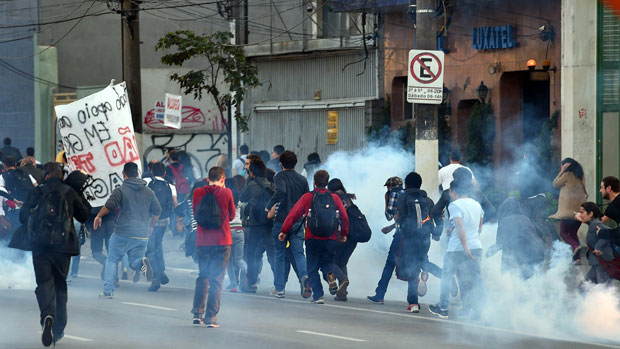Sao Paulo violence stokes World Cup protest fears
With the opening match of the World Cup fast approaching, violence threatens to disrupt the tournament

A free daily email with the biggest news stories of the day – and the best features from TheWeek.com
You are now subscribed
Your newsletter sign-up was successful
With just two days to go before the start of the World Cup, fears are growing that the tournament will be marred by violent street protests.
During the latest unrest in Sao Paulo yesterday police used tear gas to disperse striking subway workers at a central commuter station in Brazil's most populous city.
Union bosses have since suspended the strike but are warning they will ballot their members on Wednesday with the possibility of reinstating it on Thursday – the day Sao Paolo hosts Brazil and Croatia in the opening game of the tournament.
The Week
Escape your echo chamber. Get the facts behind the news, plus analysis from multiple perspectives.

Sign up for The Week's Free Newsletters
From our morning news briefing to a weekly Good News Newsletter, get the best of The Week delivered directly to your inbox.
From our morning news briefing to a weekly Good News Newsletter, get the best of The Week delivered directly to your inbox.
A strike would be disastrous for the World Cup organisers as the subway is the principal mode of transport for World Cup fans, who must travel 12 miles east of Sao Paulo to reach the stadium.
Monday’s clashes involved riot police and around 100 subway workers who were striking for a fifth consecutive day over pay. They are demanding a 12.2 per cent pay rise, while the government has offered 8.7 per cent.
Assuring reporters that he had no wish to disrupt the World Cup, Altino Prazeres, president of the union leading the strike, said: "I love football. I support our national team. The point is not to stop the Cup…[but] we want to resolve this today and all are willing to negotiate."
He also threatened broader action against the government if police action against strikers was not called off.
A free daily email with the biggest news stories of the day – and the best features from TheWeek.com
"If the beating continues we are going to talk to all the sectors," he said. "If our people bleed we are going to ask for help from the metalworkers, from the bank workers, and have a day of general strike at the opening of the cup."
According to the Guardian, the subway protest resulted in 125 miles of traffic jams last week, and is just the latest in a string of demonstrations by Brazilian workers and activists.
Earlier in the month "indigenous protesters in the capital, Brasilia, fired arrows at police during a standoff over land rights", the paper reports.
For the moment the authorities are maintaining their hardline stance with Sao Paulo Governor Geraldo Alckmin saying there is "nothing to discuss" with the union leaders.
-
 The problem with diagnosing profound autism
The problem with diagnosing profound autismThe Explainer Experts are reconsidering the idea of autism as a spectrum, which could impact diagnoses and policy making for the condition
-
 What to know before filing your own taxes for the first time
What to know before filing your own taxes for the first timethe explainer Tackle this financial milestone with confidence
-
 The biggest box office flops of the 21st century
The biggest box office flops of the 21st centuryin depth Unnecessary remakes and turgid, expensive CGI-fests highlight this list of these most notorious box-office losers
-
 Epstein files topple law CEO, roil UK government
Epstein files topple law CEO, roil UK governmentSpeed Read Peter Mandelson, Britain’s former ambassador to the US, is caught up in the scandal
-
 Iran and US prepare to meet after skirmishes
Iran and US prepare to meet after skirmishesSpeed Read The incident comes amid heightened tensions in the Middle East
-
 Israel retrieves final hostage’s body from Gaza
Israel retrieves final hostage’s body from GazaSpeed Read The 24-year-old police officer was killed during the initial Hamas attack
-
 China’s Xi targets top general in growing purge
China’s Xi targets top general in growing purgeSpeed Read Zhang Youxia is being investigated over ‘grave violations’ of the law
-
 Panama and Canada are negotiating over a crucial copper mine
Panama and Canada are negotiating over a crucial copper mineIn the Spotlight Panama is set to make a final decision on the mine this summer
-
 Why Greenland’s natural resources are nearly impossible to mine
Why Greenland’s natural resources are nearly impossible to mineThe Explainer The country’s natural landscape makes the task extremely difficult
-
 Iran cuts internet as protests escalate
Iran cuts internet as protests escalateSpeed Reada Government buildings across the country have been set on fire
-
 US nabs ‘shadow’ tanker claimed by Russia
US nabs ‘shadow’ tanker claimed by RussiaSpeed Read The ship was one of two vessels seized by the US military